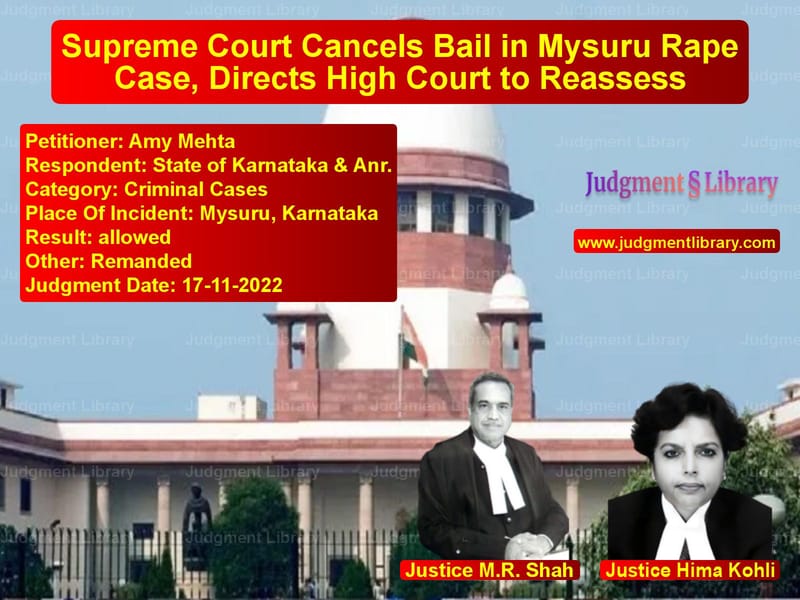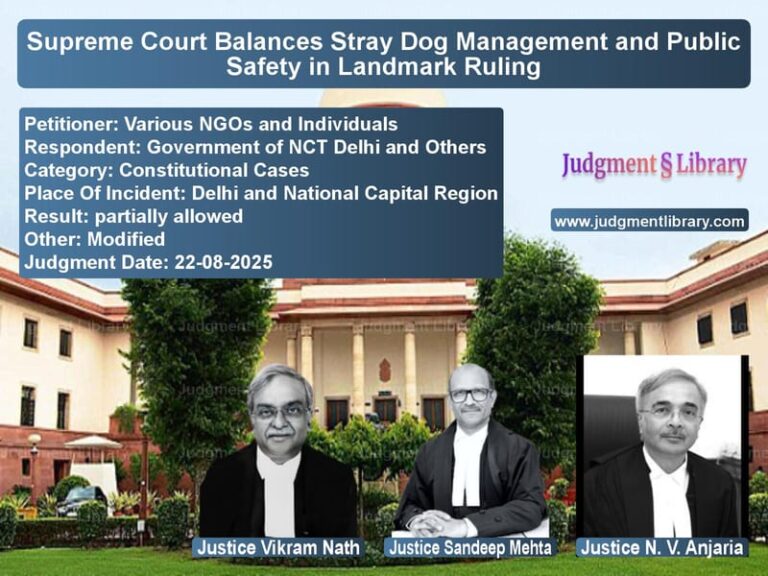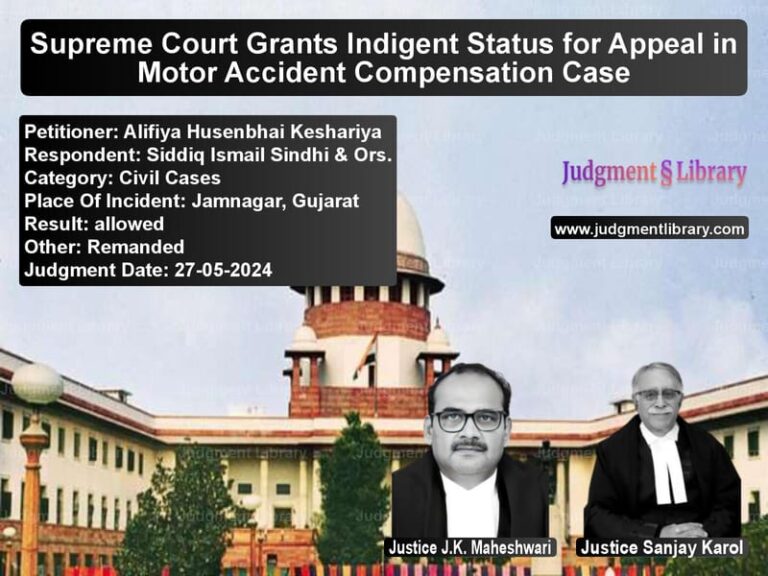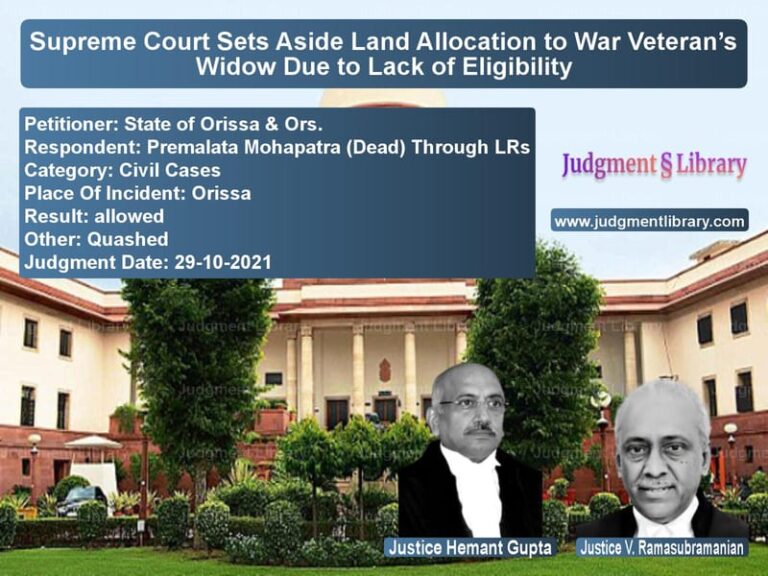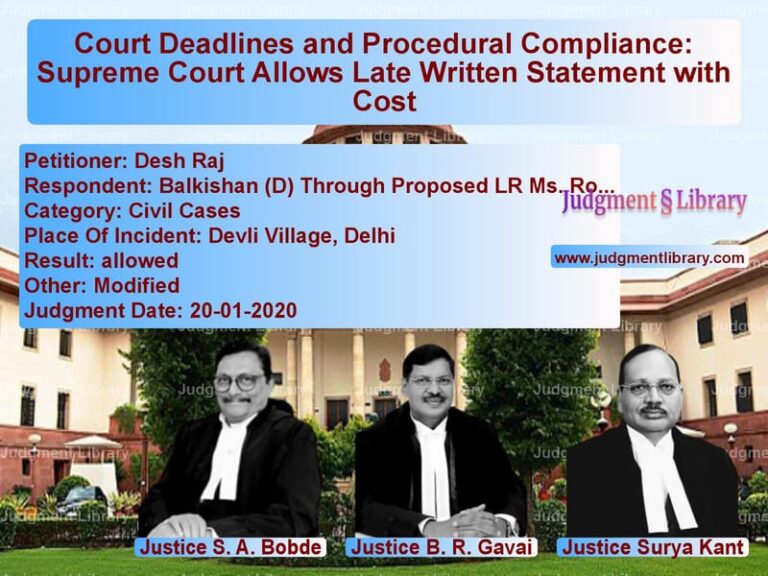Supreme Court Cancels Bail in Mysuru Rape Case, Directs High Court to Reassess
The Supreme Court of India recently ruled in the case of Amy Mehta vs. State of Karnataka & Anr., setting aside the Karnataka High Court’s order granting bail to an accused in a high-profile rape case. The Court held that the High Court failed to consider the seriousness of the allegations, the evidence collected, and the victim’s statement before granting bail. The case is now remitted to the High Court for fresh consideration.
The ruling emphasizes the need for judicial caution in granting bail in serious offenses like rape, ensuring that victim statements and evidence are thoroughly examined.
Background of the Case
The case stems from an incident in Mysuru, Karnataka, where the victim, Ms. Amy Mehta, alleged that the accused, a known acquaintance, intoxicated her by spiking her drink and then sexually assaulted her. The FIR was registered under Sections 376 (rape), 354 (assault on a woman with intent to outrage modesty), 328 (causing hurt by poison), and 120B (criminal conspiracy) of the Indian Penal Code.
The accused was arrested on February 11, 2022, but later secured bail from the Karnataka High Court on June 10, 2022. The victim challenged the bail order in the Supreme Court, arguing that the High Court had overlooked crucial aspects of the case.
Arguments by the Parties
Appellant (Victim – Amy Mehta)
- Argued that the High Court failed to consider the seriousness of the offense while granting bail.
- Highlighted that there was sufficient medical and forensic evidence supporting her allegations.
- Pointed out that the High Court placed undue emphasis on the alleged delay of five days in filing the complaint, ignoring that she had first sought medical attention.
- Contended that the accused’s release could lead to intimidation and tampering with evidence.
Respondent (Accused)
- Maintained that the delay in filing the complaint cast doubts on the allegations.
- Argued that the victim and accused had consumed alcohol together voluntarily and that there was no evidence of spiking.
- Pointed out that the accused had been in custody since February 2022 and that further incarceration was unnecessary.
Observations by the Supreme Court
The Supreme Court conducted a detailed review of the High Court’s bail order and made the following key observations:
- The High Court failed to consider the seriousness of the allegations and the gravity of the offense.
- The victim had sought medical help immediately after regaining consciousness, which justified the delay in lodging the FIR.
- The High Court did not adequately review the investigation material and the statement of the victim.
- The observation that custodial trial was unnecessary was irrelevant in a rape case.
The Court quoted:
“In cases involving serious offenses such as rape, bail should not be granted without a comprehensive evaluation of the evidence collected during the investigation.”
Final Verdict
The Supreme Court allowed the appeal and ruled as follows:
- The Karnataka High Court’s bail order was quashed.
- The accused was directed to surrender within one week before the concerned court or jail authority.
- The High Court was instructed to reassess the bail application considering all the material evidence and the gravity of the offense.
Impact of the Ruling
This judgment reinforces judicial caution in bail matters involving serious offenses. Key takeaways include:
- Stringent Bail Consideration: Courts must thoroughly examine victim statements and forensic evidence before granting bail in rape cases.
- Delay in Filing FIR Not Always Fatal: The ruling clarifies that delays due to trauma or medical attention should not be held against the victim.
- Judicial Accountability: High Courts must justify bail orders with detailed reasoning, especially in sexual assault cases.
Conclusion
The Supreme Court’s decision in this case underscores the importance of balancing the rights of the accused with the need to ensure justice for victims. The ruling reinforces that bail in rape cases should not be granted lightly and must be based on a thorough review of evidence.
Read also: https://judgmentlibrary.com/supreme-court-acquits-protestors-in-kerala-public-property-damage-case/
The case will now return to the Karnataka High Court for fresh adjudication on the accused’s bail application, ensuring that all relevant evidence is properly considered.
Petitioner Name: Amy Mehta.Respondent Name: State of Karnataka & Anr..Judgment By: Justice M.R. Shah, Justice Hima Kohli.Place Of Incident: Mysuru, Karnataka.Judgment Date: 17-11-2022.
Don’t miss out on the full details! Download the complete judgment in PDF format below and gain valuable insights instantly!
Download Judgment: amy-mehta-vs-state-of-karnataka-&-supreme-court-of-india-judgment-dated-17-11-2022.pdf
Directly Download Judgment: Directly download this Judgment
See all petitions in Bail and Anticipatory Bail
See all petitions in Judgment by Mukeshkumar Rasikbhai Shah
See all petitions in Judgment by Hima Kohli
See all petitions in allowed
See all petitions in Remanded
See all petitions in supreme court of India judgments November 2022
See all petitions in 2022 judgments
See all posts in Criminal Cases Category
See all allowed petitions in Criminal Cases Category
See all Dismissed petitions in Criminal Cases Category
See all partially allowed petitions in Criminal Cases Category

